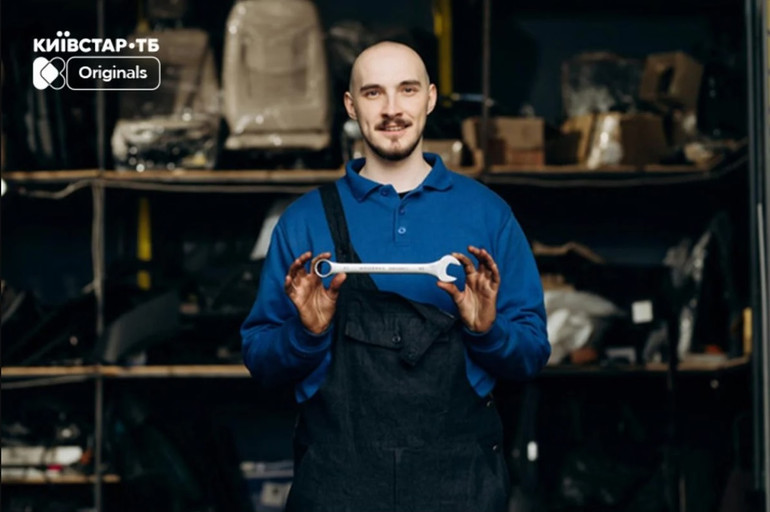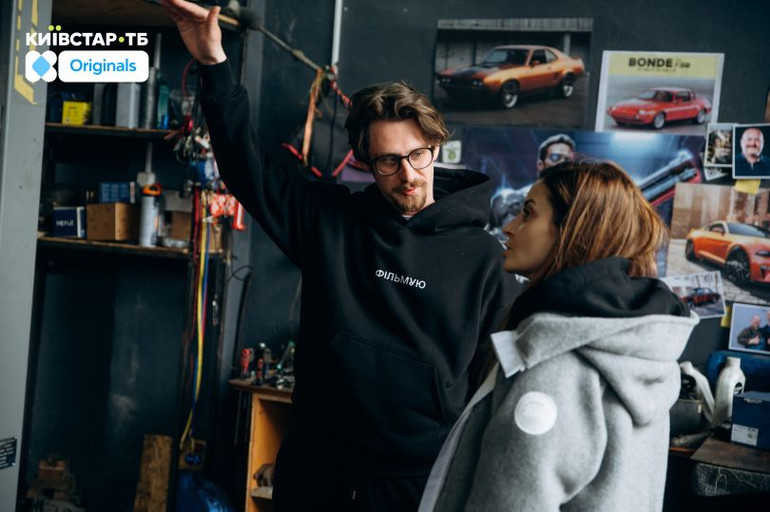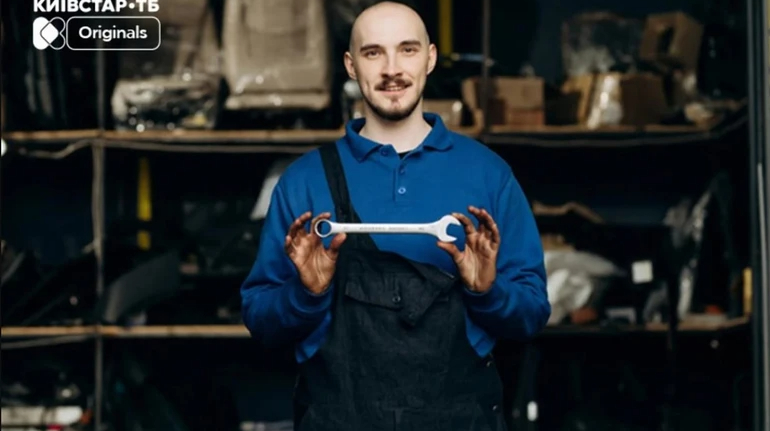“
UP. Culture begins the review of serial novelties of the Ukrainian market.
It is already a world-renowned success story: a company that started as a DVD rental business has today changed the rules of the film industry and the way content is consumed online. Of course, we are talking about Netflix. Today, Netflix is associated not only with an online movie library, but also with the concept of “own content” and the word Originals. Later, other platforms joined the race to produce exclusive films and series.
But the main thing: streaming has changed the approach to creating series, giving authors more freedom. Gone are age rating restrictions and the risk of getting into an unattractive “night slot”. Since the 2010s, series from procedural dramas about doctors or cops or sitcoms have turned into a full-fledged branch of cinema, where every season is like a big-budget movie.
Creating unique content is not a fad, but a way to maintain business, attract new users (and ideally, keep them on the platform for a long time) and stand out from the competition. Therefore, it is not surprising that this trend reached Ukrainian streaming services as well. “Vitya” itself can be called the first industrial case for our market.
“Vitya” began as the diploma short film of the same name by a graduate of the Ukrainian Film School Maksym Susyda. The film received an award in the “Eastern European Short Film” nomination at the European Short Awards festival, and later won the pitch from FILM.UA, which brought Kyivstar TV into the partnership. This is a success story.
“Where are we now? In Lubny”, – with these words begins the 12-episode journey of Viti.
Vitya, a mechanic, works at a service station in Lubny under the leadership of his father Viktor Viktorovych. But his dream is to be a psychologist and help people. But who needs psychologists in Lubny? As Viti’s colleague at the STO says: “What am I, stupid, talking for money?”

Vita still lacks experience and cases in the psychological portfolio to be hired in Kyiv. So he makes a plan: to find clients in a city where psychologists are almost mythical creatures; at the same time, understand with the father, for whom psychology is definitely not considered a profession; and eventually get a job in the capital.
At first, it seemed that “Vitya” would follow the classic scheme of sitcoms: each series is a complete story of a client. And so it was: in the first episodes, characters with problems appear – alcoholism, difficulties in the family, the inability to build relationships. But it didn’t quite happen like that, and this is precisely the advantage and the disadvantage of the series.

The plot focuses on the main character (it’s not for nothing that his name is in the title) and reveals his relationship with his parents, especially his father, the process of accepting himself, establishing his own boundaries. Because of this, the series constantly changes the genre. In addition to a dramedy on the topic of psychology – a kind of Ukrainian version Shrinking – there is a family drama, a melodrama and even a criminal line.
Thanks to this polygenre, the series does not let you get bored, but at the same time you feel that some genres are better for the authors than others. As long as the story stays within the boundaries of human relationships, it is sincere and subtly calibrated when talking about serious things through laughter. But as soon as local bandits and rackets appear in the frame, the comedy turns into a farce that is hard to believe.
Separately, it is worth dwelling on the topic of psychotherapy, which occupies a central place in the series. “Vitya” does an excellent job of destigmatizing psychology. Despite the fact that in the English-speaking infospace there is already talk about over-therapizing – “too much therapy”, when people cannot make a decision without a psychotherapist – in Ukraine, outside of the big cities, the attitude towards psychotherapy is still often mocking, wary, and sometimes downright aggressive.

The authors aptly captured this social mood and showed the gradual acceptance of psychology on the example of the characters. The plot arc of Viti’s father was especially painful – from ironic jokes and attempts to “monetize” therapy (“you go to the first session – you get a technical examination as a gift”) to accepting the son’s choice. The series gently but convincingly removes the stigma from psychotherapy – and it does it to the full.
If we simplify the difference between a movie and a TV series, then in a movie we follow the events, and in a TV series we follow the characters. And Vitya really wants to watch.
Actor Viktor Dufynets perfectly embodied the image of a young guy, a little lost, but with a big dream, who knows himself well, although sometimes he is afraid to show it. His dynamics with the world – his father, his friends, his clients, his potential girlfriend – are alive and natural.
Unfortunately, this cannot be said about all actors. Some look organic in the frame, but the majority, when they are not saying lines, as if they do not know what to do, just stand there, waiting for instructions. Because of this, the general picture sometimes seems artificial.
Another minus is musical accompaniment. Pop hits by modern Ukrainian artists sound good, and the title song “Anyway, everything will be cool” easily gets stuck in your head. But at emotional moments, lyrical compositions sound too loud and obtrusive, as if shouting: “This is an important scene!”, which destroys the magic of inclusion.

Instead, the language sounds organic. The Poltava surzhik, which was popularized a few years ago by Antonio Lukich in the movie “Luxembourg, Luxembourg”, works flawlessly again. In addition, thanks to the streaming format, the characters can indulge in profanity – and it looks believable, as if you really went behind the scenes of the service station.
Lukich’s influence is also felt more widely: similar humor, generational conflict, journey to dream job. The authors do not hide these parallels – in the scene in the cinema near the box office there is a tribute poster “Liechtenstein, Liechtenstein”. And the names of the series like “Three billboards on the border of Lubny” or quotes from Harry Potter create a feeling of playing with the viewer.
How to evaluate “Vitya”? Currently, there is no strong tradition of original series in Ukraine – “Catch Kaidash” or “The First Swallows” are rather exceptions than the system. And comparing our content within the Hollywood model is pointless: different budgets, different industry, different serial culture.
We are just beginning to build our rules. And in these rules, “Vitya” can be called a strong debut – with flaws, but also with its own strengths. The series is able to entertain, evoke empathy – and, as a pleasant bonus, teach the “5-4-3-2-1” grounding technique.

”, — write: www.pravda.com.ua
UP. Culture begins the review of serial novelties of the Ukrainian market.
It is already a world-renowned success story: a company that started as a DVD rental business has today changed the rules of the film industry and the way content is consumed online. Of course, maybe and about Netflix. Today, Netflix is associated not only with an online movie library, but also with the concept of “own content” and the word Originals. Later, other platforms joined the race to produce exclusive films and series.
But the main thing: streaming has changed the approach to creating series, giving authors more freedom. Gone are age rating restrictions and the risk of getting into an unattractive “night slot”. Since the 2010s, series from procedural dramas about doctors or cops or sitcoms have turned into a full-fledged branch of cinema, where every season is like a big-budget movie.
Creating unique content is not a fad, but a way to maintain business, attract new users (and ideally, keep them on the platform for a long time) and stand out from the competition. Therefore, it is not surprising that this trend reached Ukrainian streaming services as well. “Vitya” itself can be called the first industrial case for our market.
“Vitya” began as the diploma short film of the same name by a graduate of the Ukrainian Film School Maksym Susyda. The film received an award in the “Eastern European Short Film” nomination at the European Short Awards festival, and later won the pitch from FILM.UA, which brought Kyivstar TV into the partnership. This is a success story.
“Where are we now? In Lubny”, – with these words begins the 12-episode journey of Viti.
Vitya, a mechanic, works at a service station in Lubny under the leadership of his father Viktor Viktorovych. But his dream is to be a psychologist and help people. But who needs psychologists in Lubny? As Viti’s colleague at the STO says: “What am I, stupid, talking for money?”

Vita still lacks experience and cases in the psychological portfolio to be hired in Kyiv. So he makes a plan: to find clients in a city where psychologists are almost mythical creatures; at the same time, understand with the father, for whom psychology is definitely not considered a profession; and eventually get a job in the capital.
At first, it seemed that “Vitya” would follow the classic scheme of sitcoms: each series is a complete story of a client. And so it was: in the first episodes, characters with problems appear – alcoholism, difficulties in the family, the inability to build relationships. But it didn’t quite happen like that, and this is precisely the advantage and the disadvantage of the series.

The plot focuses on the main character (it’s not for nothing that his name is in the title) and reveals his relationship with his parents, especially his father, the process of accepting himself, establishing his own boundaries. Because of this, the series constantly changes the genre. In addition to a dramedy on the topic of psychology – a kind of Ukrainian version Shrinking – there is a family drama, a melodrama and even a criminal line.
Thanks to this polygenre, the series does not let you get bored, but at the same time you feel that some genres are better for the authors than others. As long as the story stays within the boundaries of human relationships, it is sincere and subtly calibrated when talking about serious things through laughter. But as soon as local bandits and rackets appear in the frame, the comedy turns into a farce that is hard to believe.
Separately, it is worth dwelling on the topic of psychotherapy, which occupies a central place in the series. “Vitya” does an excellent job of destigmatizing psychology. Despite the fact that in the English-speaking infospace there is already talk about over-therapizing – “too much therapy”, when people cannot make a decision without a psychotherapist – in Ukraine, outside of the big cities, the attitude towards psychotherapy is still often mocking, wary, and sometimes downright aggressive.

The authors aptly captured this social mood and showed the gradual acceptance of psychology on the example of the characters. The plot arc of Viti’s father was especially painful – from ironic jokes and attempts to “monetize” therapy (“you go to the first session – you get a technical examination as a gift”) to accepting the son’s choice. The series gently but convincingly removes the stigma from psychotherapy – and it does it to the full.
If we simplify the difference between a movie and a TV series, then in a movie we follow the events, and in a TV series we follow the characters. And Vitya really wants to watch.
Actor Viktor Dufynets perfectly embodied the image of a young guy, a little lost, but with a big dream, who knows himself well, although sometimes he is afraid to show it. His dynamics with the world – his father, his friends, his clients, his potential girlfriend – are alive and natural.
Unfortunately, this cannot be said about all actors. Some look organic in the frame, but the majority, when they are not saying lines, as if they do not know what to do, just stand there, waiting for instructions. Because of this, the general picture sometimes seems artificial.
Another minus is musical accompaniment. Pop hits by modern Ukrainian artists sound good, and the title song “Anyway, everything will be cool” easily gets stuck in your head. But at emotional moments, lyrical compositions sound too loud and obtrusive, as if shouting: “This is an important scene!”, which destroys the magic of inclusion.

Instead, the language sounds organic. The Poltava surzhik, which was popularized a few years ago by Antonio Lukich in the movie “Luxembourg, Luxembourg”, works flawlessly again. In addition, thanks to the streaming format, the characters can indulge in profanity – and it looks believable, as if you really went behind the scenes of the service station.
Lukich’s influence is also felt more widely: similar humor, generational conflict, journey to dream job. The authors do not hide these parallels – in the scene in the cinema near the box office there is a tribute poster “Liechtenstein, Liechtenstein”. And the names of the series like “Three billboards on the border of Lubny” or quotes from Harry Potter create a feeling of playing with the viewer.
How to evaluate “Vitya”? Currently, there is no strong tradition of original series in Ukraine – “Catch Kaidash” or “The First Swallows” are rather exceptions than the system. And comparing our content within the Hollywood model is pointless: different budgets, different industry, different serial culture.
We are just beginning to build our rules. And in these rules, “Vitya” can be called a strong debut – with flaws, but also with its own strengths. The series is able to entertain, evoke empathy – and, as a pleasant bonus, teach the “5-4-3-2-1” grounding technique.

